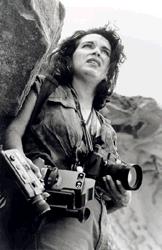Tracey Moffatt
dal 26/7/2002 al 6/10/2002
Segnalato da
26/7/2002
Tracey Moffatt
Williams College Museum of Art, Williamstown
Document. Comprised of three videos 'Heaven' (1997), 'Artist' (1999), and 'Nice Colored Girls' (1987) Tracey Moffatt: Document represents several distinct yet related approaches to video making. While each piece serves as a record of a particular event, concept, or experience, each uses different techniques to express its individual messages, including seemingly unedited surveillance, found footage, and experimental documentary.

Document
Williams College Museum of Art is pleased to present Tracey Moffatt:
Document on view to the public from July 27 through October 6, 2002 in Media
Field, a gallery space dedicated exclusively to video and new media.
Comprised of three videos'Heaven' (1997), 'Artist' (1999), and 'Nice
Colored Girls' (1987)Tracey Moffatt: Document represents several distinct
yet related approaches to video making. While each piece serves as a record
of a particular event, concept, or experience, each uses different
techniques to express its individual messages, including seemingly unedited
surveillance, found footage, and experimental documentary.
Shot with a hand-held camera at Sydney's Manly and Bondi Beaches, 'Heaven'
sneaks a peek at good-looking surfers changing out of their wetsuits and
swim trunks on the side of the road with only skimpy towels to protect them
from Moffatt's prying gaze. With the rough and spontaneous feel of a home
movie, the 1997 video provides a lighthearted critique of sexual
objectification. Made in collaboration with filmmaker Gary Hillberg,
'Artist' (1999) is a hilarious and fast-paced montage of clichéd
representations of artists in popular Hollywood movies and television shows.
Moffatt's earliest experimental film from 1987, 'Nice Colored Girls,'
investigates the ongoing social conflicts between Australia's Aborigine
women and white men, looking to traditional ethnographic documentaries as an
inspiration for her critique. Moffatt's narratives are intentionally
nonlinear, leaving questions open and allowing viewers to fill in the blanks
with their own knowledge and experiences.
An Australian-born photographer, filmmaker, and videographer, Tracey Moffatt
is a leading international artist whose work challenges expectations and
defies categorization. Her work has been shown extensively in venues
throughout the world, including at the Dia Center for the Arts in New York,
the São Paolo and Sydney Bienniales, and it can also be seen in the
collections of the Museum of Modern Art, NY, the Tate Gallery of London, the
Museum of Fine Arts, Boston.
Tracey Moffatt: Document is organized by Lisa Dorin, Curatorial and Programs
Assistant. Videos are courtesy of Women Make Movies and Paul Morris Gallery,
NY.
The Williams College Museum of Art is a participating member in The Vienna
Project, a collaboration among eleven arts and cultural institutions in the
Berkshires. WCMA's contribution to the project, Prelude to a Nightmare: Art,
Politics, and Hitler's Early Years in Vienna 1906-1913, runs from July 13
through October 27.
A portion of the museum's general operating funds for this fiscal year has
been provided through grants from the Institute of Museum and Library
Services, a federal agency that fosters innovation, leadership, and a
lifetime of learning, and from the Massachusetts Cultural Council, a state
agency. The Williams College Museum of Art is open Tuesday through Saturday
from 10 a.m. to 5 p.m., and Sunday from 1 to 5 p.m. Admission is free and
the museum is wheelchair accessible.
Contact:
Jonathan Cannon
Public Relations Coordinator
Williams College Museum of Art
Williamstown MA 01267
413.597.3178



